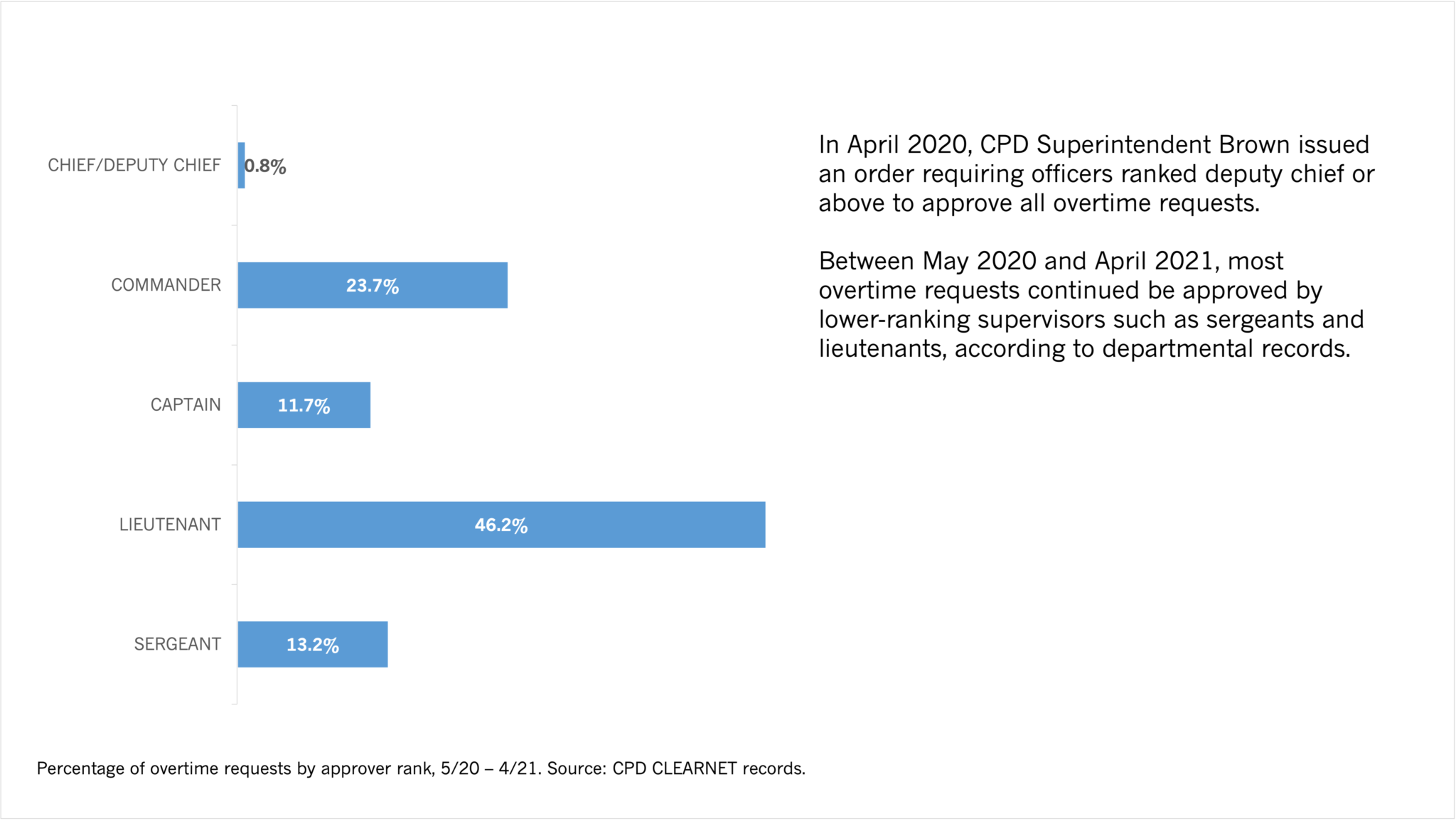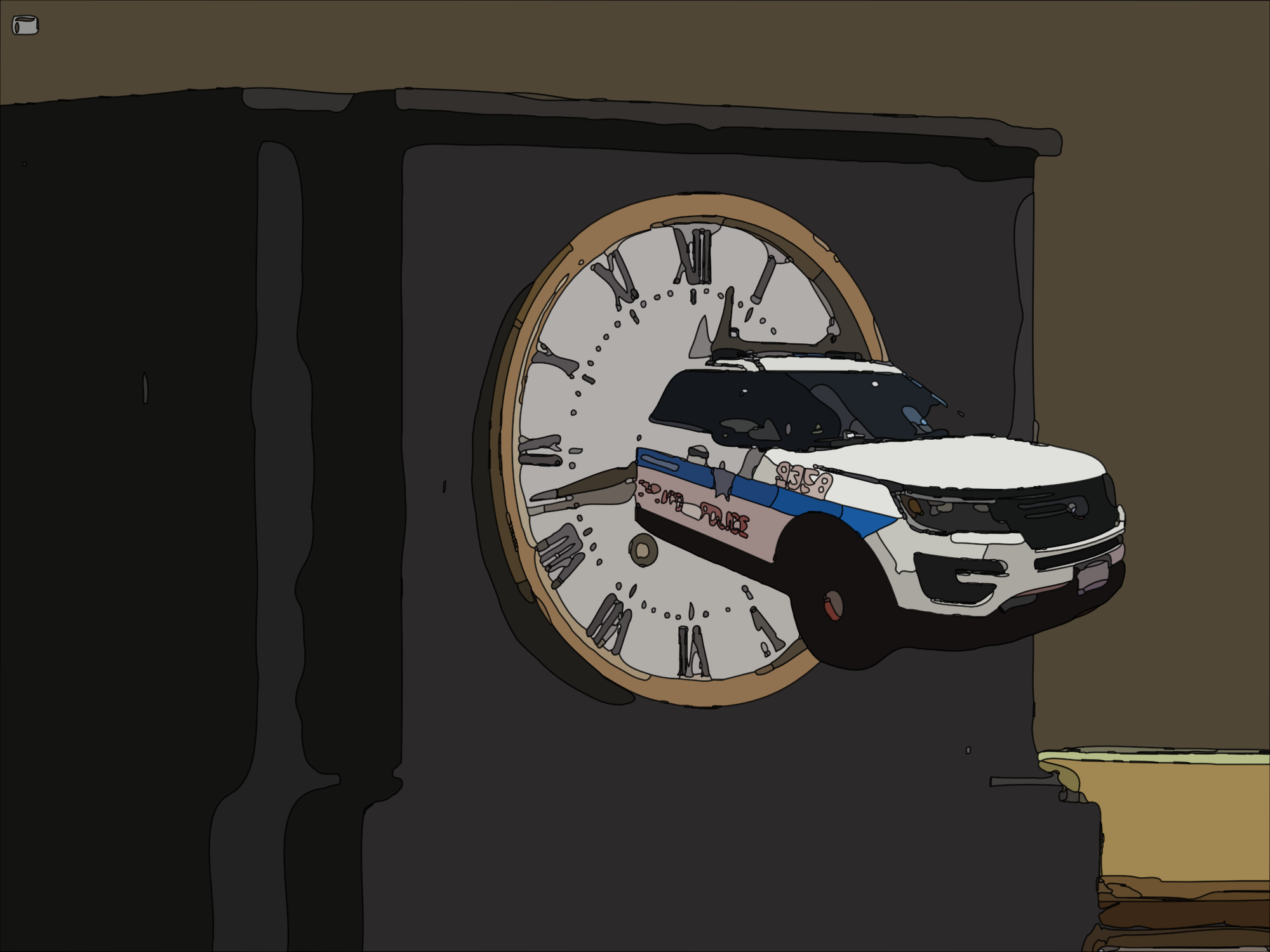Shortly after taking command of the Chicago Police Department in April 2020, Superintendent David Brown moved to curtail overtime spending by issuing an order requiring supervisors who are ranked deputy chief or higher to approve all overtime requests. More than a year later, it’s unclear whether that order had any effect.
Records obtained by the Weekly appear to indicate the vast majority of overtime clocked by officers since Brown issued the directive has been approved by lower-ranking officers such as lieutenants and sergeants, who seem to still be primarily responsible for managing its oversight. The department claims that is simply because lower-ranking supervisors are entering the data, and insists all overtime is being authorized by deputy chiefs and above.
The directive—one of Brown’s first as superintendent—followed a similar one issued in late 2019 by then-Interim Superintendent Charlie Beck that elevated overtime supervision to district commanders, rather than leaving it in the hands of lieutenants and sergeants. Making district- and area-level supervisors such as commanders (as Beck did) and deputy chiefs (per Brown’s order) responsible for approving overtime apparently had little effect on spending.
Overtime expenditures rose steadily each year from around $45 million at the start of the decade until 2017, when the department spent $161 million on it. That year, the City’s Office of the Inspector General (OIG) audited the department’s use of overtime, and found CPD lacked “basic operational controls” for spending. Following the audit, overtime spending fell to $122.5 million in 2018, but rose again the following year. In 2020, CPD broke department records by spending more than $177 million on overtime. Last week, City Budget Director Susie Park told the Sun-Times she anticipates spending at least $150 million on it this year.
At a press conference last year, Brown shrugged off the Weekly’s question about overtime supervision. “Nothing to see here. We are good stewards of the taxpayers’ dollars and we don’t apologize for that,” he said. “We wanted to ensure that we were making sure we were spending the taxpayer dollars as it relates to overtime in the most prudent way, and we feel satisfied that’s being done.”
Brown’s April 2020 directive says no officer can work overtime “without the approval of the member’s appropriate higher-ranking supervisor AND approval of the member’s exempt supervisor the rank of deputy chief or above.” [emphasis original]. Deputy chiefs or higher are required to grant final approval by signing an overtime or compensatory time report, according to the directive. According to a CPD Freedom of Information Act (FOIA) officer, the department no longer uses such reports, and instead uses an automated system called CLEARNET.
To understand what effect Brown’s April order had on overtime supervision, the Weekly sent FOIA requests to CPD for timekeeping data and other records. The department provided spreadsheets generated from CLEARNET, that show all overtime officers earned from April 28, 2020 through May 1, 2021. The spreadsheets also list the name and rank of the officer who granted prior authorization for each overtime request and the supervisor who later approved it. We analyzed the data to determine how often supervisors of each rank approved or authorized the requests.
The data indicates that Brown’s directive had little effect on the day-to-day supervision of overtime. In the twelve months following the order, sergeants and lieutenants are listed as having authorized or approved more than half of all overtime earned between May 1, 2020 and April 21, 2021. Deputy chiefs and other top-ranking officers are listed as having approved or authorized less than five percent of it.
A CPD spokesperson told the Weekly that all overtime is authorized by deputy chiefs or above, despite what the data seems to show. The spokesperson said the CLEARNET records show lower-ranking supervisors authorizing it because the person inputting the deputy chief’s authorization can be any other officer under their command. “That individual’s name would show up in the electronic system, though the Deputy Chief would still be the approving individual,” the spokesperson said.
But Brown’s order regarding overtime supervision clearly states: “Members will document approval with the name and PC Login ID number of the approving supervisor in the ‘Overtime Authorized By’ section of the Overtime/Compensatory Time Report.”

One way the department has said it is holding deputy chiefs accountable for overtime is in CompStat meetings, where command staff review crime statistics, prevention, and other administrative matters with area and district and area commanders. When asked in meetings last year, some commanders told their superiors they had no control of overtime due to COVID-19 and that summer’s protests.
Via FOIA requests, the Weekly obtained notes, summary reports, and transcripts of CompStat meetings held between April and December 2020. According to the records, overtime was discussed at about half of those CompStat meetings. In those instances where transcripts of the discussions were available, commanders repeatedly stated they had no control of increased overtime due to the department-wide orders.
At a May 14 CompStat meeting, then-Deputy Chief of Crime Control Strategies Thomas Lemmer (who has since retired) asked then-8th District Commander Brian McDermott why overtime due to officers involuntarily working on regular days off (RDOs) had recently increased. “It was because of the COVID and RDOs being canceled,” McDermott replied. “It was beyond my control.”
At a meeting on May 28, Lemmer similarly asked 2nd District Commander Joshua Wallace why the amount of overtime due to officers working on days off had increased. “Officers working their days off were out of my control with COVID,” Wallace replied.
At an Area 4 CompStat meeting in October 2020, “not notifying DC for approval of overtime” was noted as an ongoing administrative issue; “DC” could refer either to Deputy Chiefs or District Commanders. In either case, the department was aware of the problem regarding approvals. It’s unclear what steps, if any, were taken to fix the problem.
The apparent lack of overtime supervision by top brass continued through this year. In March 2021, about one percent of overtime was approved or authorized by a deputy chief or higher, according to the CLEARNET data we reviewed.
Our analysis uncovered a number of additional anomalies in the data:
Between May 2020 and April 2021, the same officer who was listed as initially authorizing the overtime was listed as also having later approved it seventy percent of the time—a problem that was flagged in the OIG’s 2017 audit.
In the nearly 25,000 overtime entries that were categorized as being for court duty, only five had an authorizing officer listed. A CPD spokesperson said that according to department directives, when an officer receives notification to appear in court while on-duty, “no additional signatures are required for authorization.” While that’s true, Brown’s directive also requires officers to enter a court notification record number, yet the CLEARNET spreadsheets don’t even have a field for entering such data.
Two police officers, Edmund Szudy and Anthony Papadakis, authorized nearly all the overtime earned for “special voluntary duty.” Cops earn this categorization of overtime by working on their days off to provide extra security to the Park District, Chicago Housing Authority, and Chicago Transit Authority. The spokesperson reiterated that this is because individuals below the rank of Deputy Chief can enter the overtime data into the electronic system. Again, the order requires the approving supervisor’s name to be entered, not the name of the officer doing data entry.
Has Brown’s directive had any impact? It’s hard to tell. The department no longer uses paper reports that would get a deputy chief’s signature, as the Superintendent’s order dictates. CPD’s electronic timekeeping system allows any supervisor under a deputy chief’s command to enter themselves in the “approved” and “authorized” fields, according to the department, so there’s no record of which deputy chief signed off (if any). When district commanders were asked about increased overtime at CompStat, they repeatedly said they had no control over it; at least one meeting noted the problem of “DCs” not even being notified of overtime requests.
And the City expects overtime spending to continue to exceed $150 million annually.
“We understand how important it is to ensure public safety while also being responsible with taxpayer resources,” the CPD spokesperson told the Weekly. “We will continue to review the use of overtime and ensure it is being used appropriately and efficiently.”
Jim Daley is the Weekly’s politics editor. He last investigated the police officer who attacked activist Miracle Boyd at a 2020 protest. Kiran Misra covers criminal justice and policing in Chicago for the Weekly. She last interviewed Cook County Public Defender Sharone Mitchell, Jr.

